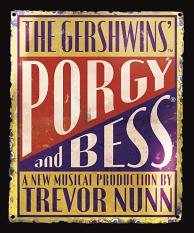Porgy and Bess - Review
It's not often that technical 'gremlins' strike theatrical productions in the West End. And that's a very significant testament to the professionalism of all the - generally unsung - crew who silently work behind the scenes, ensuring that shows always go on. So the technical team for 'Porgy and Bess' were doubly unlucky to have gremlins strike twice in the same night. Shortly after the beginning of the show, the house lights came back on and the act drop had to be brought down, and there was a five minute delay while the show was restarted. And it happened again - though for different reasons, I think - about 20 minutes into the second half. This time the gremlins had struck the sound desk, and a more lengthy delay ensued. At this juncture and with the prospect of a re-start fading, I took my leave of the piece, only to find after the lengthy climb from the stalls to street level that it had resumed.
Technical glitches apart, this new version of 'Porgy and Bess', Directed by Trevor Nunn, unsurprisingly bears all the hallmarks of a quality production, and one that really should be seen. First performed in 1935 and conceived as an opera, it now regularly plays as part of the operatic repertoire. Nunn has directed the show several times before, but here has turned it into a musical version (or what he describes as a 'book musical'), substantially shortened and amended. Having taken the knife to it, Nunn has actually managed to lift the show to new and more accessible dramatic heights, but he's also chosen actors who more than do justice to his artistic intentions as well as the piece itself. The singing is not only consistently moving and melodic, there's power enough to give the enchanting and beautifully crafted songs the treatment they truly deserve. And some of the songs are now timeless classics, such as 'It ain't necessarily so', I got plenty of nuttin', 'I loves you, Porgy', and what has now become a jazz standard, 'Summertime'.
Catfish Row in Charleston, South Carolina during the Great Depression of the early 1930's is the run-down and dilapidated setting for the show. When we first meet her, Bess is the prostitute lover of Crown, a bullying and formidably muscular pimp. When Crown kills a man in a gambling fight, he has to flee from the police, and Bess finds sanctuary with the crippled Porgy, who's the only person who will take her in. Life seems to have given Bess a second chance when Crown returns intent on winning her back. But Porgy is not going to give up Bess without a struggle.
Clarke Peters is not only highly convincing as the handicapped Porgy, but has an immensely rich and powerful voice too. And he's well supported by Nicola Hughes as Bess, Cornell S John as Crown and O-T Fagbenle as the flashy drug dealer, Sporting Life. And the rest of the cast have excellent voices which produce spine-tingling harmonies. Clarity of diction and sensitive orchestrations also enable us to hear almost every word that's being sung, in spite of the complexity of Gershwin's score.
'Porgy and Bess' has been the subject of controversy for years - maybe even from the time it was first penned. Many black actors have refused to appear in the show, and some who have - like Sidney Poitier - have regretted it afterwards. The focus of the controversy revolves around the depiction of Black Americans. Many of the characters are often described as 'low-life' - gamblers, prostitutes, killers, drug dealers and the like. Although I can readily appreciate, and indeed sympathise with, the objections of those who find the show offensive, I don't see it in quite the same way. The majority of the residents of Catfish Row are portrayed as decent, hard-working folk - many of them with deeply religious convictions - eking out a meagre existence as many, both black and white, had to do in the 1930s. There's also a definite (if weak) political message at the end of the show, when Porgy heads off to find Bess, suggesting hope and, perhaps, a new direction for Black Americans as a whole.
Whatever your views about the political niceties or correctness of 'Porgy and Bess', the staggeringly fine and subtly complex music - brilliantly adapted here by Gareth Valentine - is justification enough to see the show, and maybe re-evaluate it as a socially descriptive, historical piece.
(Peter Brown)
What the critics had to say.....
NICHOLAS DE JONGH for THE EVENING STANDARD says, " Ardent production." PAUL TAYLOR for THE INDEPENDENT says, " 'Electrifying' is an overworked word in the critical lexicon, but if ever a show deserved it, it is Trevor Nunn's magnificent revival of the Gershwins' Porgy and Bess." SCOTT MATTHEWMAN for THE STAGE says, "A visual and aural spectacle." MICHAEL BILLINGTON for THE GUARDIAN says, "If the show now seems a museum-piece, Nunn's production invests it with social detail...this is an essentially conservative show." BENEDICT NIGHTINGALE for THE TIMES says, "Nunn's company brings enormous energy and plenty of class to Ira Gershwin's libretto."
External links to full reviews from popular press
The Guardian
The Independent
The Times
Originally published on
